Al-Kaabneh
Products:
Overview
Shown
here
are
hand-made
local
products
made
in
and
around
Al-Kaabneh
and
Hebron,
Palestine;
for
possible
inclusion
in
a
global
Greenstar
ecommerce
website.
Wool
tapestries,
rugs
and
small
items
of
clothing
are
hand-made
on
a
small
loom
in
the
village
of
Al-Kaabneh.
The
people
use
the
black
wool
of
their
goats,
and
the
white
wool
of
their
sheep,
weave
elaborate
traditional
patterns
and
dye
the
wool
with
natural
colors
from
the
local
market.
The
tapestry
below
is
from
a
very
large
piece
about
4
ft.
wide
and
16
ft.
long,
used
as
a
place
for
groups
of
people
to
sit
for
a
meal.
It
took
a
village
woman
almost
three
months
to
weave.

A
wide
variety
of
high-quality
brassware
is
made
in
the
Hebron
area,
near
Al-Kaabneh.
The
designs
are
very
old,
in
many
cases
dating
to
Biblical
times;
new
brassware
being
made
today
bears
a
striking
resemblance
to
items
found
in
archeological
sites
from
2500
years
ago.
Pictured
below
are
a
long-handled
brass
coffee
server
and
a
silver
teapot;
a
brass-and-copper
teapot;
an
array
of
brass
coffee
servers
in
traditional
Arab
style;
and
several
kinds
of
small
coffee
grinders,
intended
for
kitchen
and
personal
use
by
hand.

 In
Hebron
is
an
extraordinary
ceramics
and
glass
workshop,
on
one
of
the
main
thoroughfares
leading
into
this
largely
Palestinian
town.
A
vast
selection
of
beautiful
ceramics
is
formed
by
hand
on
site,
individually
hand-painted,
and
fired
in
a
clay
oven.
The
designs
are
virtually
as
old
as
civilization,
typical
of
Bedouin
crafts
that
trace
their
lineage
to
Phoenician
and
Biblical
times
over
3000
years
ago.
Show
below
are
several
types
of
serving
trays
and
dinner
plates,
a
complete
ceramic
tea
set
with
small
cups,
small
bowls
and
coffee
cups.
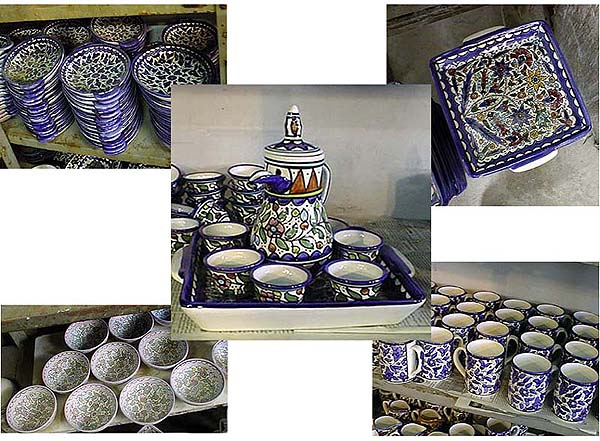
Also
made
in
the
Hebron
ceramics
shop
are
modern
versions
of
two
of
the
oldest
objects
found
in
archeological
sites
around
the
Middle
East:
a
small
oil
lamp,
and
a
small
vase.
A
close
comparison
of
the
patterns,
clay
materials
and
shapes
of
these
items,
to
similar
items
dates
to
3500
BC
and
earlier
in
Palestine
and
Babylonia,
shows
virtually
no
change
over
the
millennia.

Shown
here
is
a
sequence
of
photographs
from
the
Hebron
glassmaking
shop.
They
start
with
raw
sand
from
the
nearby
desert,
south
toward
Al-Kaabneh;
melt
it,
blow
and
form
it,
roll
it
and
apply
colors
and
glaze.
A
single
glass
or
vase,
like
those
shown
below,
takes
between
5
and
10
minutes
to
complete
by
hand
on
the
two
small
glass
forges.
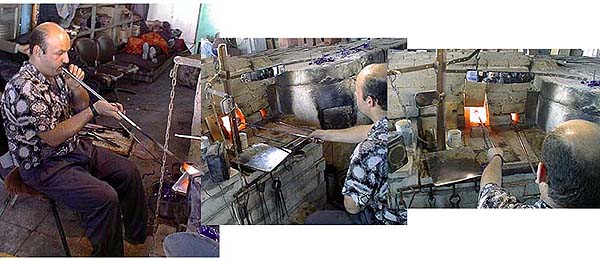 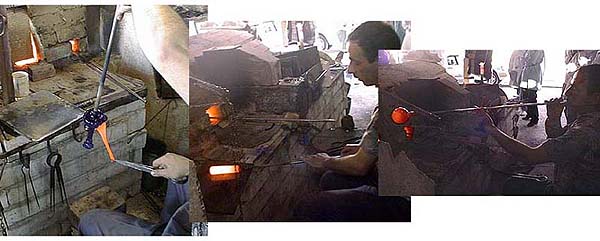
The
variety
of
glassware
from
the
Hebron
shop
is
phenomenal;
all
designs
are
based
on
shapes
and
forms
that
have
been
well-known
in
Palestine
for
millennia.
There
are
bud
vases
and
large
flower
vases,
water
glasses,
cups,
goblets
and
wine
glasses,
many
of
them
with
the
distinctive
spiral
on
the
exterior.
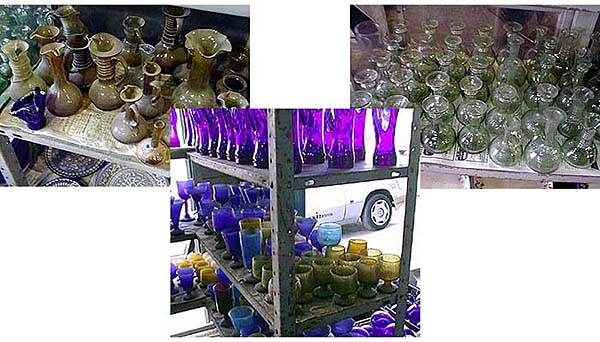 
Two
simple
musical
instruments,
with
a
long
and
significant
lineage,
are
made
by
hand
in
Al-Kaabneh.
Show
below,
left,
is
the
rebaba,
a
single-stringed
instrument
that
dates
back
to
classical
Egypt;
it
is
made
of
sheep's
hide
and
goat
sinew,
with
a
bow
of
camel
hair.
The
rebaba
has
no
frets,
so
it
has
a
free-form
scale
and
an
open,
reedy
voice;
it
is
the
historical
antecedent
of
both
the
guitar
and
the
violin.
The
musician
is
Ahmad
Abu-Sabha,
an
engineer
for
the
Palestinian
Energy
Authority
who
grew
up
about
30
km.
from
Al-Kaabneh.
Below,
right,
is
a
bamboo
flute,
with
a
double
barrel,
each
shaft
tuned
slightly
differently
with
adjustable
plugs
so
that
it
produces
a
haunting,
polyphonic
sound.
These
flutes
are
hand-made
from
Egyptian
bamboo,
and
played
by
the
herders
of
sheep
and
goats
in
the
rocky
high
desert
near
the
village.
The
musician
below
is
Audi
Najjadeh,
head
of
the
Al-Kaabneh
Village
Council.
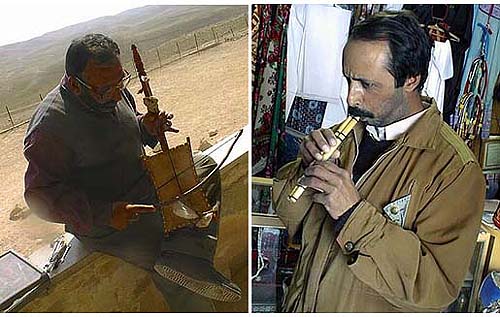  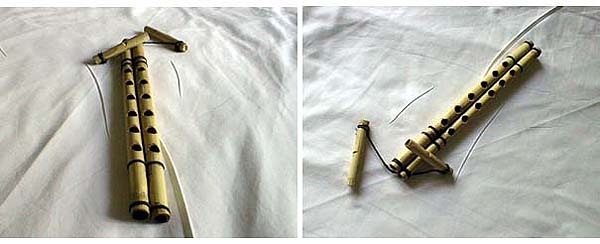
|